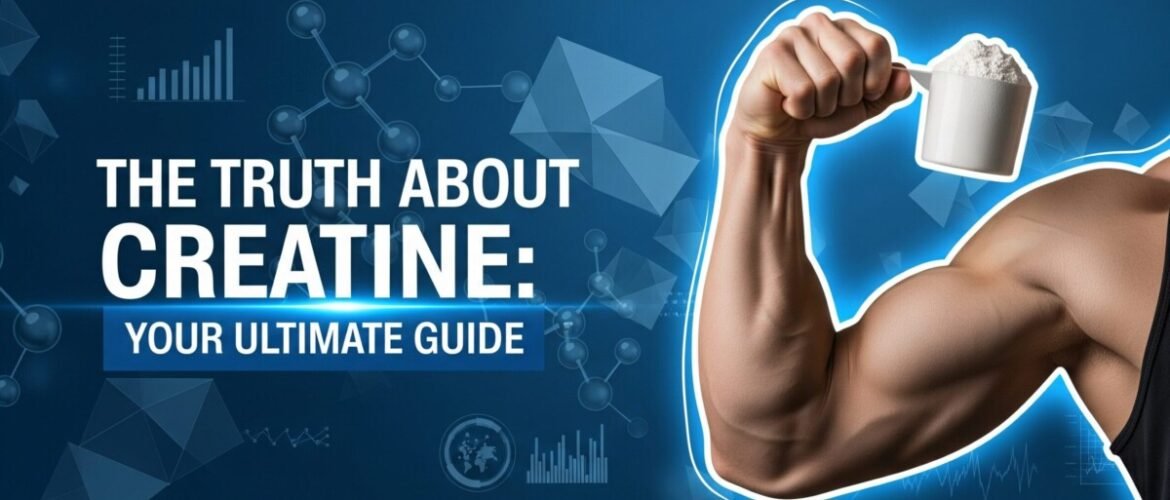No products in the cart.
The Truth About Creatine: Your Ultimate Guide to Benefits, Side Effects, and Maximum Gains

If you’ve spent any time in a gym or a supplement store, you’ve almost certainly heard of creatine. It’s one of the most popular and well-researched sports supplements on the market. But with so much information (and misinformation) out there, it can be tough to separate fact from fiction.
Is it safe? Is it a steroid? How do you even take it?
Whether you’re a seasoned athlete looking for an edge or a beginner just starting your fitness journey, this guide has you covered. We’re diving deep into what creatine is, how it works, and what it can do for you.
What is Creatine and How Does It Work?
First things first, let’s clear up a common misconception: Creatine is not a steroid. It’s a naturally occurring compound that your body produces from amino acids. It’s also found in foods like red meat and seafood.
Creatine’s primary role is to help your muscles produce energy during high-intensity exercise, like lifting weights or sprinting. It does this by increasing your body’s stores of phosphocreatine, which is used to regenerate ATP (adenosine triphosphate) – your body’s main energy currency.
Think of it as a reserve power source for your muscles, allowing you to push out those extra reps or go a little harder in your workouts.
Top 5 Science-Backed Benefits of Creatine Monohydrate
The reason creatine is so popular is simple: it works. Here are some of the most significant benefits, backed by extensive research:
- Increased Muscle Mass and Strength: Creatine has been shown time and time again to increase lean body mass and strength when combined with resistance training.
- Enhanced Athletic Performance: By providing more energy for high-intensity exercise, creatine can help you run faster, lift heavier, and perform better in a wide range of sports.
- Improved Recovery: Creatine may help reduce muscle damage and inflammation following intense exercise, leading to a quicker recovery.
- Cognitive Benefits: Emerging research suggests that creatine may also have brain-boosting benefits, including improved memory and cognitive function, particularly in older adults and vegetarians.
- Excellent Safety Profile: For healthy individuals, creatine has been shown to be safe for both short-term and long-term use.
Debunking the Myths: Is Creatine Safe?
Let’s tackle some of the most common concerns head-on:
- “Will it damage my kidneys?” This is perhaps the most persistent myth. However, numerous studies have shown that creatine does not harm the kidneys of healthy individuals when taken at recommended doses. If you have pre-existing kidney disease, you should consult with your doctor before taking creatine.
- “Does it cause bloating or water retention?” Creatine does pull water into your muscle cells, which can lead to a slight increase in weight. However, this is primarily intracellular water, which is a good thing – it can make your muscles look fuller and may even contribute to muscle growth. Any initial bloating usually subsides after the first week or so.
- “Does creatine cause hair loss?” The link between creatine and hair loss is weak and largely based on a single study that showed an increase in a hormone called DHT, which is linked to male pattern baldness. However, this study did not directly measure hair loss, and subsequent research has not replicated these findings.
How to Take Creatine for the Best Results
There are two main approaches to taking creatine:
- The Loading Phase: This involves taking a higher dose of creatine (around 20-25 grams per day, split into 4-5 servings) for 5-7 days to quickly saturate your muscles. After the loading phase, you drop down to a maintenance dose.
- The Maintenance Dose: This approach skips the loading phase and involves taking a smaller dose (3-5 grams per day) from the start. It will take longer to saturate your muscles (about 3-4 weeks), but it’s just as effective in the long run and may be gentler on your stomach.
When should you take it? The timing of your creatine dose doesn’t seem to matter much. The most important thing is to take it consistently every day. Many people find it convenient to mix it with their pre- or post-workout shake.
Who Should Consider Taking Creatine?
Creatine can be beneficial for a wide range of people, including:
- Athletes and Bodybuilders: For those looking to maximize their performance and muscle growth, creatine is a proven winner.
- Fitness Enthusiasts: Even if you’re not a competitive athlete, creatine can help you get more out of your workouts and reach your fitness goals faster.
- Vegetarians and Vegans: Since creatine is primarily found in animal products, vegetarians and vegans tend to have lower creatine stores and may see even greater benefits from supplementation.
- Older Adults: Creatine may help combat age-related muscle loss and improve cognitive function in older adults.
The Bottom Line
Creatine monohydrate is one of the safest, most effective, and most affordable supplements available. Whether you’re looking to build muscle, boost your performance, or simply get more out of your workouts, creatine is a fantastic choice.
Ready to unlock your full potential? Give creatine a try and experience the difference for yourself!
Start your wellness journey today — Visit Unike Nutra Now
Follow us
Facebook – https://www.facebook.com/profile.php?id=61567462823245
Instagram – https://www.instagram.com/unikenutra/
Twitter – https://x.com/Unikenutra
LinkedIn: https://www.linkedin.com/company/unike-nutra/
Amazon: https://www.amazon.com/stores/UnikeNutra/
